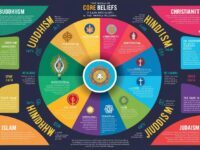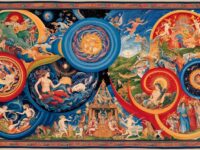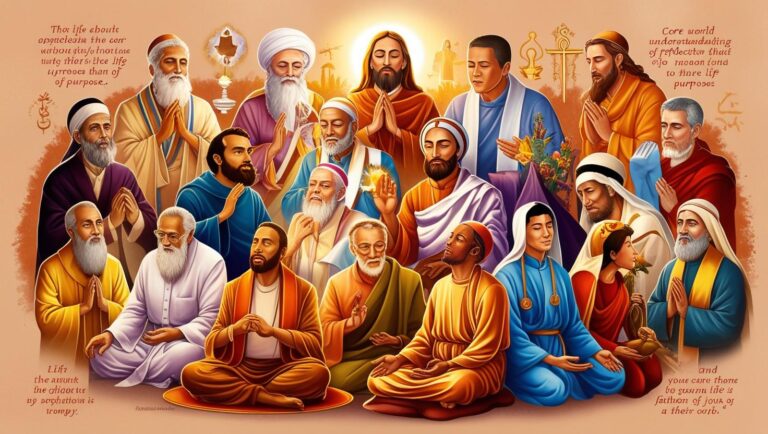In a world brimming with diverse beliefs and practices, the search for life’s purpose remains a universal quest. Through the lens of world religions, individuals often find meaning, direction, and a sense of belonging. This exploration, while deeply personal, is also a shared journey that connects people across cultures and traditions. Join us as we delve into how various faiths from around the globe illuminate pathways toward understanding life’s purpose.
Discovering Meaning: A Dive into Global Faiths
Religions around the world offer rich tapestries of narratives, rituals, and teachings that help followers navigate the complexities of life. In Hinduism, for example, the concept of “dharma” provides a framework for living in harmony with one’s duty and the moral order of the universe. This ancient faith teaches that by fulfilling one’s dharma, individuals can achieve a sense of balance and progress toward “moksha,” the ultimate liberation from the cycle of rebirth and suffering. Here, purpose is seen as a journey toward self-realization and spiritual liberation.
Similarly, Buddhism emphasizes the journey toward enlightenment as the ultimate goal of life. The teachings of the Buddha focus on the Four Noble Truths and the Eightfold Path, guiding adherents to overcome suffering and attain “nirvana,” a state of complete liberation and peace. For Buddhists, life’s purpose is intricately tied to cultivating mindfulness, wisdom, and compassion, thereby transcending worldly attachments and achieving spiritual awakening. This approach highlights an inward journey of self-discovery and inner peace.
In contrast, the Abrahamic religions—Judaism, Christianity, and Islam—often frame life’s purpose in terms of a relationship with a divine being. In Christianity, the belief in Jesus Christ as the Savior shapes the purpose of life around faith, love, and service to others, culminating in eternal life with God. Islam teaches submission to Allah’s will as the ultimate purpose, guiding Muslims through the Five Pillars to live a life of faith, prayer, charity, fasting, and pilgrimage. Judaism emphasizes living by the Torah and following God’s commandments as a way to fulfill one’s purpose and contribute to the greater good of the community. Each of these faiths offers a pathway to purpose through devotion and moral living.
Seeking Purpose: Insights from World Religions
Beyond individual practices, many world religions offer insights into collective purpose and community life. Confucianism, primarily a philosophical and ethical system, suggests that the purpose of life is found in the cultivation of virtue and the maintenance of harmony in relationships and society. This Confucian ideal underscores the importance of family, respect for elders, and social responsibility as keys to achieving a purposeful life. By focusing on ethical conduct and social harmony, individuals contribute to a stable and flourishing society.
Indigenous spiritual traditions also offer unique perspectives on life’s purpose. Many Native American tribes, for instance, view humans as an integral part of a larger ecosystem, where purpose is derived from living in harmony with nature and respecting all life forms. This worldview emphasizes the interconnectedness of all beings and the importance of stewardship over the earth. Through rituals, storytelling, and the guidance of elders, these traditions impart a sense of responsibility toward the environment and future generations, offering a purpose rooted in ecological balance and sustainability.
Lastly, modern secular philosophies, while not religious in nature, also engage with the question of life’s purpose. Existentialism and humanism, for example, suggest that individuals are responsible for creating their own purpose through choices and actions. These perspectives emphasize personal freedom, creativity, and the pursuit of knowledge as pathways to a meaningful life. By encouraging self-determination and critical thinking, secular philosophies provide a framework for individuals to construct a sense of purpose independent of religious beliefs.
Whether through ancient traditions or contemporary philosophies, the quest for life’s purpose is a profound journey that transcends cultural and religious boundaries. World religions offer a wealth of wisdom and guidance, helping individuals find meaning and direction in their lives. As we explore these diverse pathways, we discover not only the richness of human spirituality but also the shared aspirations that unite us in our search for understanding and fulfillment. In this interconnected world, the pursuit of purpose becomes a bridge that links us in our common humanity.

















